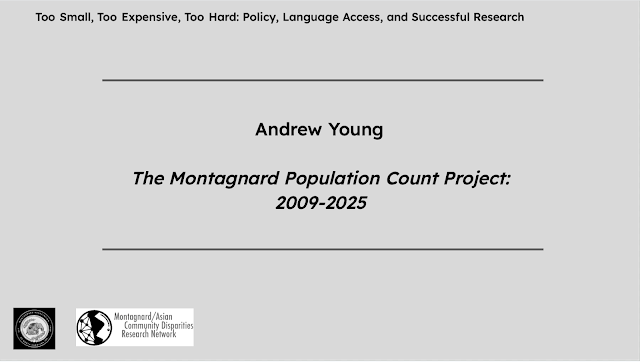2025 Asia Scholar Network Conference and Bringing Southeast Asia Home Workshop
April 12, 2025
Starting in 2009, I worked with the community to frame the problem.
The community arrived in three waves. Here in this diagram you see a black arrow timeline with 1986, 1992, and 2001 marked to represent each wave. 200, 400, and then we really lose track, because in between and afterwards there were individual and family arrivals. After 2001 came many family reunifications, often wives and children rejoining fathers after many years of separation. In the past decade or so there have been Montagnards who’ve arrived with immigrant status rather than as refugees.
Births and deaths are on record. But there are other records to consult, too. Many Montagnard names are distinctly different from Vietnamese names. The traditonal naming conventions are different, too.
We believe the data exists but it is hidden in records.
I think it is critical to point out the impact of the Web and modern communications. In the past people got on boats, waved goodbye to their birth country, and never returned. Letters were few and far between.
In the past few years we’ve seen VCR tapes of weddings and funerals mailed from small villages replaced by CDs, then expensive phone cards bought at convenience stores and tobacco shops replaced by Skype, then Facetime and now smartphones. These clearly influence identities and how communities see themselves.
In this Venn diagram we see how “Over There” and “Over Here” identities overlap.
Many refugees are of Southeast Asian origin. And often they are disproportionately very low income. They are not the “crazy rich Asians” portrayed in film.
Having worked with many communities, we know they have some common characteristics that described by the social determinants (or drivers) of health yield similar community health profiles
Indeed, researchers and community members presented them last year at our Community Research Symposium.
We can further pinpoint where many low-income Asian Americans of refugee origin live based on the history of the state
On the granular level, we know where people live, thanks to community partnerships. In 2010, we knew Rosewood was a neighborhood that was about 25% Montagnard.
Refugee resettlement begun in the 1980s placed many refugees into Charlotte, the Triangle, New Bern, and especially in the Triad region. Montagnards were especially resettled in Greensboro.
Refugee communities are present in these green circles, the Charlotte-Mecklenburg and Triangle, but they are primarily home to highly educated, highly paid Asian Americans of Indian subcontinent and East Asian origin.
There are costs associated with providing services like Language Access. We can’t know them without disaggregating NC Asian American population data.
Other services and needs can’t be meant without this basic knowledge. Giving caregivers, clinicians, and police officers information about the languages spoken or customs followed by Montagnards and other communities is useful on a case by case basis, but they don’t give decision makers numbers about the size of communities or how to allocate resources.


















